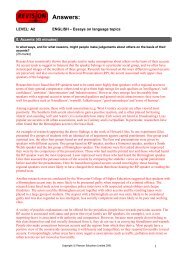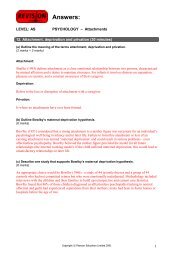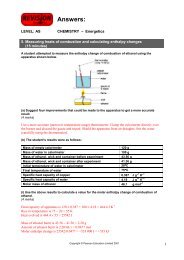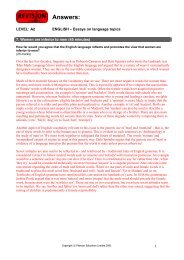The Dove Campaign for Real Beauty - Pearson
The Dove Campaign for Real Beauty - Pearson
The Dove Campaign for Real Beauty - Pearson
Create successful ePaper yourself
Turn your PDF publications into a flip-book with our unique Google optimized e-Paper software.
Chapter 2 Sustainable marketing: marketing ethics and social responsibilitySecondary smoking is another example of a negative externality, but not all externalities arenegative. Where more than one in three people install anti-theft vehicle tracker systems in theircars, a positive externality occurs since the overall car crime rate goes down. Similarly, if morethan one in ten install radar-controlled cruise control systems, the stop-start motor congestionon the roads declines <strong>for</strong> all drivers.<strong>The</strong> social cost of goods such as SUVs or their bull bars may appear trivial to a buyer who isignorant of the third-person costs, or because the events that incur the third-person costs, suchas running over and killing a child, are rare.<strong>The</strong> remoteness of negative externalities can lead to their neglect. In the nineteenth century,many people in England were ignorant of the squalor of working-class life until it was graphicallyillustrated in novels like Charles Dickens’ Oliver Twist. Likewise, the cruelty of slavery wasinvisible to early generations, although not to later ones. In this century, it is not apparent that apair of trainers that you buy was produced in a Third-World sweatshop or that a piece of hardwoodfurniture would involve destroying tribal areas in Borneo or the Amazon basin.As the SUV examples show, marketers can achieve an immediate return from supplying goodswhere a third party pays the cost. Is the strategy sustainable? In the case of SUVs whose safety isillusory, it is akin to selling a dangerous good based on mythical safety claims. This flies in theface of the basic marketing concept. <strong>The</strong>re is also a danger of a consumer backlash. In manycountries SUVs and the perceived anti-social attitudes of their owners have become something ofa joke. In other cases, banning the offending behaviour can wreck once-lucrative markets, as isoccurring with bull bars and smoking in public places. Democratic governments have the abilityto protect their own people from negative externalities, although it often takes pressure groupsto stimulate action.Where negative externalities are borne by distant peoples, the impulse <strong>for</strong> government actionis diminished. Hence the emergence of campaigners who use all the skills of modern marketingto communicate their concerns – Live Aid and Live Eight, aimed at the G8 summit in Scotland,are global examples. Like Nike in sportswear and B&Q in wood, enlightened marketers also seethe danger of reputation loss such as that which Nike faced or the opportunity to make theirproducts more appealing to concerned customers, as did B&Q by making sure their wood camefrom renewable sources.Many of the earlier concerns of environmentalists were the impact of pollution and otherpractices upon people who live now. Excessive use of private transport was a problem becauseof the environmental pollution and congestion it causes here and now. Global warming, however,implies that the true cost of our love of heating, air-conditioning, flying, power boats, electricalequipment that is instantly available and private motorised transport will be borne by futuregenerations or even during the lifetime of current students.Environmentally harmful consumptionEnvironmentally harmful behaviour is not new. <strong>The</strong> ancient Greek philosopher Aristotlerecognised that: ‘That which is common to the greatest number has the least care bestowed uponit.’ For a long time this did not matter beyond the local community. Over-fishing may havedestroyed the cod banks off North America’s coast, London was smothered in its Dickensiansmog, the Easter Islanders destroyed their lush tropical island, and the colonists of Greenlandovergrazed their land, making its name seem oddly inappropriate, but elsewhere in the world itdid not matter. <strong>The</strong>se are all cases of <strong>The</strong> Tragedy of the Commons, a term derived originallyfrom a parable published by William Forster Lloyd in 1833. 49 Over-exploitation occurs becauseconsumption benefits individuals who are motivated to maximise their own use of the resource,while the costs of exploitation are distributed to all.“That which is common to the greatest number has the least care bestowedupon it.“<strong>The</strong> Tragedy of theCommons—Free access tofinite resource ultimatelydooms the resource byover-exploitation.111
















